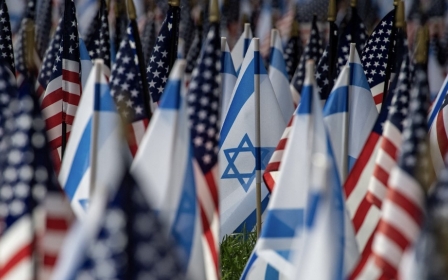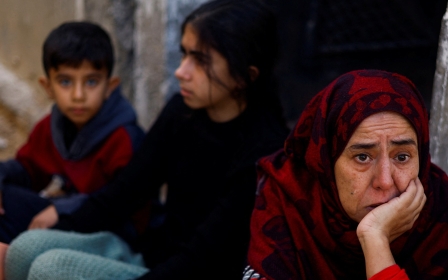War on Gaza: Israel's deadliest weapon is time

If you asked me to name the most dangerous weapon that Israel possesses, my answer would not be bombs, shells or even nuclear arms.
Rather, it would be time. After four months of war and the resounding silence of the international community, Palestinians and their supporters around the globe have seen its devastating effects. But how does this work, and how can we resist being targeted by Israel’s weaponisation of time?
The single most effective tactic is awareness of Israel’s methods. For months now, Israeli forces have continued their relentless onslaught against Gaza, despite significant global opposition and calls for a ceasefire.
This has worked to normalise the brutality of Israel’s war, as news stories begin to fall off the front page and global attention moves elsewhere.
This strategy centres on maintaining a constant level of violence over time, and giving the impression that nothing will steer the war off course. To justify this, Israeli officials have repeated their claims that Palestinians are “human animals”, noting that the war and siege will continue as long as Israel deems it necessary.
Stay informed with MEE's newsletters
Sign up to get the latest alerts, insights and analysis, starting with Turkey Unpacked
The Israeli army has hit hospitals, schools and refugee shelters. Each attack helps to build the foundation for the next one, as statements of outrage lead to no action. Time marches on, and Israel hits another civilian neighbourhood, another camp, another hospital.
None of these actions are hidden or concealed in any way. Soldiers boast about them on social media. This all reflects the central strategy of occupation, which revolves around keeping up a constant level of violence, while waiting for concessions from the other side.
Occupying the mind
One of the most chilling examples of this strategy is the aforementioned social-media content being posted by Israeli soldiers: the smiles as they target civilians, the jokes as they destroy entire residential blocks.
This is not just for “fun”. This is a technique of killing, destroying and occupying not just populations or buildings, but also the human mind.
Follow Middle East Eye's live coverage of the Israel-Palestine war
Over time, people who initially stood up for Palestinians and held protests to end the war, begin to feel helpless and hopeless. Imagine how you might have felt during the first weeks of Israel’s genocidal assault, marching alongside millions of others worldwide to demand an immediate ceasefire.
After returning home, you see that Israel has bombed another residential tower, and watch as the Palestinian death toll climbs by several hundred more people. You feel angry, and return to the next march.
Creating this state of hopelessness among Palestine advocates is even more devastating than the killing itself
But as this cycle repeats itself over and over again, while media outlets continue to regurgitate the Israeli narrative that dehumanises Palestinians, you start to feel powerless. This is how Israel weaponises time.
When nothing changes externally, people tend to experience an unconscious shift in their own perspective. Shock and anger give way to hopelessness, which can sometimes even give way to victim-blaming, or a wish that the immediate bloodshed would end in any way possible - even through a return to the prewar misery of siege and occupation.
This is how global demands for a free Palestine can shrivel and change. And that is Israel’s ultimate goal, as it continues to wield time as a weapon. Creating this state of hopelessness among Palestine advocates is even more devastating than the killing itself.
In this context, awareness is a protective shield that can work against the Israeli strategy. It’s okay to sometimes feel hopeless; just remind yourself that there’s no shame in this. And as the war grinds on, there is still a strong impetus to march, to post, to boycott, to speak out, and to share the narrative about Palestine.
The views expressed in this article belong to the author and do not necessarily reflect the editorial policy of Middle East Eye.
Middle East Eye delivers independent and unrivalled coverage and analysis of the Middle East, North Africa and beyond. To learn more about republishing this content and the associated fees, please fill out this form. More about MEE can be found here.





